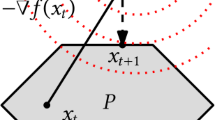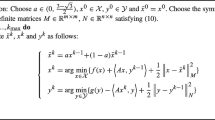Abstract
This paper describes a new randomized algorithm for calculating local optima in standard quadratic optimization problems (StQPs) over the standard simplex. The new algorithm transforms StQPs into a new form by using a fuzzification technique. This paper proves that: (1) the computational complexity of the new algorithm for computing local optima in StQPs is in the class of randomized polynomial time; (2) the solution of the new algorithm satisfies \(\epsilon -\delta \) condition. Examples are given that demonstrate that the new algorithm outperforms IBM ILOG CPLEX (CPLEX). Numerical experiments indicate that for calculating the first local optima of StQPs, the average computational time of the new algorithm is one hundred time faster than that of CPLEX when the number of variables is 1000.


Similar content being viewed by others
Data availability
Enquiries about data availability should be directed to the authors.
References
Ahmadi AA, Zhang J (2020) On the complexity of finding a local minimizer of a quadratic function over a polytope. Optimization Online 2020 at arXiv:2008.05558v2
Ammar E (2009) On fuzzy random multiobjective quadratic programming. Eur J Oper Res 193:329–341
Ammar E (2008) On solutions of fuzzy random multiobjective quadratic programming with applications in portfolio problem. Inf Sys 178(2008):468–484
Ammar E (2005) On solution analysis of quadratic programming with fuzzy random coefficients and variables. Il Nuovo Cimento, vol 120 B. N.1, Italy, pp 5–17
Ammar E, Khalifa AM (2003) Fuzzy portfolio optimization a quadratic programming approach. J Chaos Solitons Fractals 18(5):1045–1054
Arora S, Barak B (2009) Computational complexity: a modern approach. Cambridge University Press, New York, p 2009
Bhanja S, Karunaratne DK, Panchumarthy R, Rajaram S, Sarkar S (2015) Non-Boolean computing with nanomagnets for computer vision applications. Nat Nanotechnol 11:177–183
Buló SR, Pelillo M, Bomze IM (2011) Graph-based quadratic optimization: a fast evolutionary approach. Comput Vis Image Underst 115:984–995
Bomze IM, Schachinger W, Ullrich R (2017) The complexity of simple models—a study of worst and typical hard cases for the standard quadratic optimization problem. Math Oper Res 43(2):651–674
Bomze IM (2012) Copositive optimization–recent developments and applications. Eur J Oper Res 216(2012):509–520
Bomze IM, De Klerk E (2002) Solving standard quadratic optimization problems via linear, semidefinite and copositive programming. J Glob Optim 24(2):163–185
Bomze IM (1998) On standard quadratic optimization problems. J Glob Optim 13:369–387
Bomze IM (2002) Branch-and-bound approaches to standard quadratic optimization problems. J Glob Optim 22:17–37
Bonami P, Lodi A, Schweiger J, Tramontani A (2016) Solving standard quadratic programming by cutting planes. Technical Report, DS4DM-2016-001, Polytechnique Montréal
Burer S, Vandenbussche D (2008) A finite branch-and-bound algorithm for nonconvex quadratic programming via semidefinite relaxations. Math Progr 113(2008):259–282
Butler A, Kwon RH (2021) Efficient differentiable quadratic programming layers: an ADMM approach. https://doi.org/10.48550/arXiv.2112.07464
Chen J, Burer S (2012) Globally solving nonconvex quadratic programming problems via completely positive programming. Math Progr Comput 4(1):33–52
Cruz C, Silva RC, Verdegay JL, Yamakami A (2009) A parametric approach to solve quadratic programming problems with fuzzy environment in the set of constraints. In: The proceeding of IFSA-EUSFLAT 2009:1158–1163
De Klerk E (2008) The complexity of optimizing over a simplex, hypercube or sphere: a short survey. CEJOR 16:111–125
De Klerk E, den Hertog D, Elabwabi G (2008) On the complexity of optimization over the standard simplex. Eur J Oper Res 191:773–785
Chen X, Pittel B (2021) On sparsity of the solution to a random quadratic optimization problem. Math Progr 186:309–336
Gao J, Lu M, Liu L (2004) Chance-constrained programming for fuzzy quadratic minimum spanning tree problem. In: The proceeding of 2004 IEEE international conference on fuzzy systems, pp 983–987
Gao J, Lu M (2005) Fuzzy quadratic minimum spanning tree problem. Appl Math Comput 164(2005):773–788
Gao L (2020) An approximation algorithm for solving standard quadratic optimization problems. J Intell Fuzzy Syst 39(3):4383–4392
Gao L (2020) An algorithm for finding approximate Nash equilibria in bimatrix games. Soft Comput. https://doi.org/10.1007/s00500-020-05213-y
Gao L (1999) The fuzzy arithmetic mean. Fuzzy Sets Syst 107:335–348
Gondzio J, Yıldırım EA (2021) Global solutions of nonconvex standard quadratic programs via mixed integer linear programming reformulations. J Glob Optim 81:293–321
Huang Y, Palomer DP (2014) Randomized algorithms for optimal solutions of double-sided QCQP with applications in signal processing. IEEE Trans Signal Process. https://doi.org/10.1109/TSP.2013.2297683
IBM (2020) IBM ILOG. CPLEX Optimization Studio. https://www.ibm.com/products/ilog-cplex-optimization-studio. Accessed 21 Oct 2020
IBM (2017) IBM ILOG CPLEX Optimization Studio CPLEX User’s Manual Version 12 Release 8. IBM Corp., 2017
Ichnowski J, Jain P, Stellato B, Banjac G, Luo M, Borrelli F, Gonzalez JE, Stoica I, Goldberg K (2021) Accelerating quadratic optimization with reinforcement learning. In: The Proceeding of 35th conference on neural information processing systems (NeurIPS 2021)
Liu ST (2007) Solving quadratic programming with fuzzy parameters based on extension principle. In: Proceeding of IEEE international conference fuzzy systems, FUZZ-IEEE, pp 1–5
Liu B, Liu Y-K (2002) Expected value of fuzzy variable and fuzzy expected value models. IEEE Trans Fuzzy Syst 10(4):445–450
Liu YK, Gao J (2007) The independence of fuzzy variables with applications to fuzzy random optimization. Int J Uncertain Fuzziness Knowl Based Syst. https://doi.org/10.1142/S021848850700456X
Liuzzi G, Locatelli M, Piccialli V (2019) A new branch-and-bound algorithm for standard quadratic programming problems. Optim Methods Softw 34(1):79–97. https://doi.org/10.1080/10556788.2017.1341504
Mirmohseni SM, Nasseri SH (2017) A quadratic programming with triangular fuzzy numbers. J Appl Math Phys 2017(5):2218–2227
Momot A, Momot M (2009) Fuzzy weighted averaging using criterion function minimization. ICMMI 2009:273-280
Motwani R, Raghavan P (1995) Randomized algorithms. Cambridge University Press, Cambridge
Motzkin TS, Straus EG (1965) Maxima for graphs and a new proof of a theorem of T’uran. Can J Math 17:533–540
Nesterrov Y (2003) Random walk in a simplex and quadratic optimization over convex polytopes. Tech. Rep. No. 2003/71, CORE-UCL
Nowak I (1999) A new semidefinite programming bound for indefinite quadratic forms over a simplex. J Glob Optim 14:357–364
Palagi L, Piccialli V, Rendl F, Rianldi G, Wiegele A (2012) Chapter 28 computational approaches to max-cut. In: Anjos MF, Lasserre JB (eds) Handbook on semidefinite, conic and polynomial optimization. Springer, Berlin
Williams R (2007) Matrix-vector multiplication in sub-quadratic time: (some preprocessing required). In: Proceedings of the eighteenth annual ACM-SIAM symposium on Discrete algorithms(2007), pp 995–1001
Zadeh LA (1978) Fuzzy sets as a basis for a theory of possibility. Fuzzy Sets Syst 1:3–28
Zhou X, Cao B, Nasseri SH (2014) Optimality conditions for fuzzy number quadratic programming with fuzzy coefficients. J Appl Math. https://doi.org/10.1155/2014/489893
Zimmermann H-J (2001) Fuzzy set theory and its application, 4th edn. Kluwer Academic Publishers, Amsterdam
Acknowledgements
The author thanks Dr. Andrea Raiconi and the anonymous reviewers for their careful reading of the paper and for their constructive comments, which are greatly appreciated.
Funding
The authors have not disclosed any funding.
Author information
Authors and Affiliations
Corresponding author
Ethics declarations
Conflict of interest
The authors have not disclosed any competing interests.
Additional information
Publisher's Note
Springer Nature remains neutral with regard to jurisdictional claims in published maps and institutional affiliations.
Rights and permissions
About this article
Cite this article
Gao, L. Finding local optima in quadratic optimization problems in RP. Soft Comput 28, 495–508 (2024). https://doi.org/10.1007/s00500-023-08262-1
Accepted:
Published:
Issue Date:
DOI: https://doi.org/10.1007/s00500-023-08262-1




